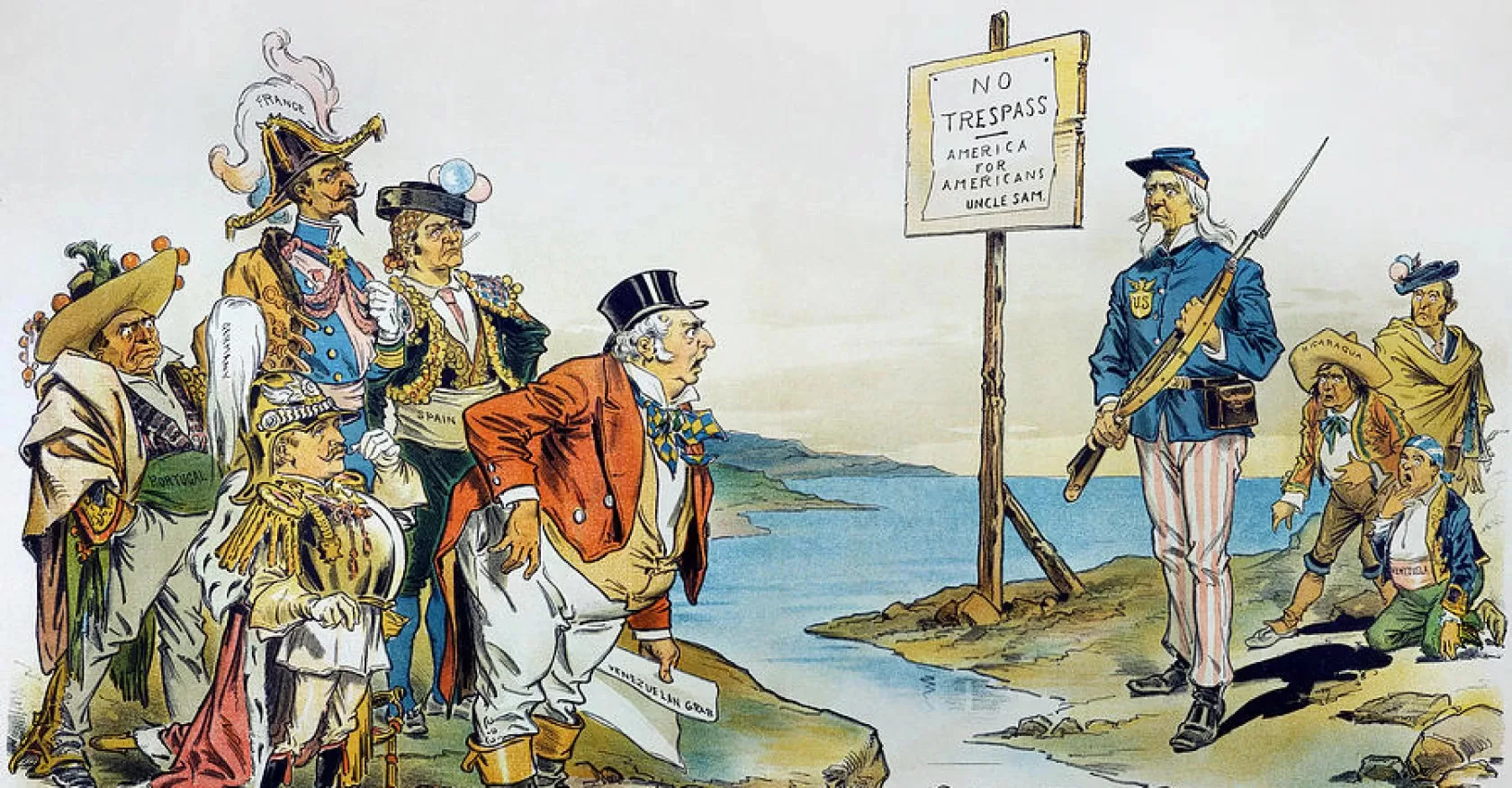Observers of contemporary American foreign policy who have not delved deeply into American history could be forgiven for thinking that the US has always been a country that routinely interfered in the affairs of other nations. Wars, color revolutions, CIA plots, naval intimidation and interfering in global affairs have been the modus operandi of the American government for the last 130 years, but this was not always so.
Prior to the very late 19th century, there was a school of thought in the US that we should generally mind our own business. Even after 1900, this impulse was a significant part of the national identity, even if it did not win all its political battles. During the administrations of the first three US presidents, there were intense efforts both internally and externally to drag the US into the giant world conflict between Britain and France. In terms of sentiment, there were opinion leaders that picked sides in who they were rooting for, but most government officials were inclined to stay out of it.
In the waning days of his second administration, George Washington himself released a document, known as Washington’s Farewell Address. The address took a firm anti-interventionist tack:
…nothing is more essential than that permanent inveterate antipathies against particular nations, and passionate attachment for others, should not be excited ; and that just, amicable feelings towards all should be cultivated. The nation which indulges toward another a habitual hatred or a habitual fondness is in some degree a slave.
The frosty but erudite John Quincy Adams, the sixth US president, held similar principles:
[America] goes not abroad, in search of monsters to destroy. She is the well-wisher to the freedom and independence of all. She is the champion and vindicator only of her own.
In 1823, President Monroe, worried about Europe’s meddling in the New World, promulgated what became known as the “Monroe Doctrine,” stating that, apart from any remaining European colonies, any attempt by a European power to colonize or re-colonize any country in North or South America would be regarded as a hostile act. In my opinion, this was a smart move to secure the United States’ weak spot, our soft underbelly of weak and often insatiable south of the Mexican border. Just as Russia has a long, flat unobstructed plain from the Polish border to Moscow, the US had a vulnerability too.
Americans continued to have a distaste for unnecessary wars well into the 19th century. In 1846, President James K. Polk ginned up an entirely unjust war against the hapless Mexicans. It was not until the Vietnam War, many years later, that a war was so controversial. The issue sharply divided the country. A lot of important people and institutions opposed the war, which included the entire Whig Party, then Congressman Abraham Lincoln and even a very young US Army lieutenant and future commander of Union troops in the Civil War, Ulysses S. Grant, who participated in the war out of a sense of duty but also a great deal of distaste:
For myself, I was bitterly opposed to the measure and to this day regard the war, which resulted, as one of the most unjust waged by a stronger against a weaker nation.
In the wake of the Union victory in the Civil War in 1865, the US gradually drifted toward a more bellicose posture toward the world. There was also an anglophilic impulse to mimic the economic successes of the British Empire. In the midst of giant wars between newspaper chains at the time, tough war talk sold newspapers. At the time, William Randolph Hearst was desperate to provoke a war between Spain and the US over Cuba. Cuba remained a Spanish colony, and Hearst and the other newspaper barons intentionally exaggerated reports of human rights abuses in Cuba by the Spanish government. There was an explosion of the battleship USS Maine while visiting Havana harbor in February of 1898 due to faulty gunpowder storage with 261 sailors killed. The “media”’ as we call it today lied that the explosion was the work of the Spaniards, a completely irrational conclusion since Spain was in no economic condition for a conflict and its navy was composed of badly outdated vessels. Spain was decisively beaten in the war that followed and the US gained a mini-empire that had to be ruled and defended from competing powers, setting the preconditions for future wars.
As Europe became more unstable in the run up to the Great War, many Americans were quite intent to stay out of European quarrels. In fact, in the 1916 presidential election, the incumbent Woodrow Wilson had as his main slogan “He Kept Us Out of War.” While many Americans were sympathetic to the Anglo/French side, most folks wanted to stay out of the carnage. German-Americans, by then a large minority of white voters, fought for neutrality as well as many socialists like Eugene Debs. Still, German cluelessness about the optics of submarine warfare and the manipulations of British intelligence in the matter of the Zimmermann telegram brought the US into the war.
Opposition to US participation in what would be the Second World War was much more robust. Although we joined the Great War very late, many thousands of young men got a taste of modern warfare in the trenches and became very determined that the US not get drawn into another conflagration. The main organization that fought for neutrality was the 800,000-strong America First Committee. The warmongers of our time love to portray the AFC as some kind of Nazi outfit. Yes, the AFC did have some sympathizers for German National Socialism in its ranks, but in reality it was one of the most diverse political movements in American political history. It had within its ranks conservative businessmen, retired generals and future Supreme Court justices. Notable individuals in the committee included aviator Charles Lindbergh, future US President Gerald Ford, Norman Thomas, head of the Socialist Party, USA and celebrated actress Lillian Gish. I have never been able to find out if the patrician New York Congressman Hamilton Fish III actually joined the AFC, but he was the most aggressive anti-interventionist in congress at the time. I got to know Fish pretty well when he was about 99 years of age, still sharp as a tack and writing books. We did some political activism together before his death at age 102.
During the Cold War, hardcore isolationism almost completely disappeared. There were some anti-interventionist sentiments held by people like Senator Eugene McCarthy and diplomat George F. Kennan. Although Kennan was a cold warrior, he was convinced that the West should be more judicious in picking its fights against Bolshevism. He thought Vietnam was a bridge too far and presented a risk for getting bogged down. He proved prophetic about this.
In the 1970s and 80s, there was a renewed interest in paleo-conservative circles in the US in isolationism. This was mainly due to the excessive one-sidedness of US policy in the Arab-Israeli conflict. The main paleo-con magazine Chronicles ran a lot of articles by Bill Kauffman, an ardent isolationist author, who still publishes a book here and there. In his three runs for the presidency, Patrick Buchanan tried to interest people in foreign policy restraint, but most were not listening. Some of these Buchananite sentiments have bled over into the later Trumpist populism. While the foreign policy of the Trump administration was somewhat more restrained than his predecessors, his sentimental Zionism and naive hero-worship of generals and admirals muted some of his good instincts.
Beginning in the 1980s and even a little bit before, there has been a quiet growth, in the academic world, of the realist school of foreign policy academics. Interestingly, most of these scholars are moderate Democrats. There are about a dozen of these professors toiling away and doing some excellent scholarship. The most famous are John J. Mearsheimer at the University of Chicago and Steven Walt of Harvard. Together, they both issued a mild manifesto a few years ago stating that the US, as a practical matter, should be less slavish toward the State of Israel. This caused an immediate uproar. Jonah Goldberg of National Review called them both anti-Semites in print, which is kind of hilarious since Dr. Mearshimer is a member of the Hebraic race. Mearshimer wrote a book in 2018 (The Great Delusion) predicting correctly that unrealistic American foreign policy goals would cause a disastrous war in Ukraine.
The US should have done a complete reassessment of its foreign policy after the end of the Cold War. This never happened. Our strategic policy is insanely overstretched with hundreds of military bases overseas defending, seemingly, every inch of the world against imagined threats. The greatness of America was guaranteed by the fact that our natural strategic position could only be described as heaven-sent. We are bordered by two weak countries in our north and south. Canada, a frozen wasteland with a tiny strip of habitable land up against our border and Mexico, an unstable, chaotic and impoverished land to the south. For our country to be invaded by an Asian or European power, they would have to build the largest combat fleet in the world with the largest amphibious fleet ever conceived in the mind of man, bigger by a factor of ten than the huge amphibious fleet the US fielded in the Second World War. All we need to do is to keep a reasonably sized Navy and Air Force and no one can touch us. We have oil, coal and natural gas that can last hundreds of years. The biggest problem of American agriculture has never been scarcity but insane over-production. With all these wonderful natural advantages, we send our young men overseas to get killed and maimed in wars that have nothing to do with our strategic interests. We are exhausted with these wars of ideology, fruitlessly trying to turn places like Iraq and Afghanistan into 19th-century-style Jeffersonian democracies. Now the fate of the American republic, apparently, rests on the precise drawing of the border between Russia and Ukraine. Famed circus promoter P. T. Barnum said it best, “There’s a sucker born every minute.”









